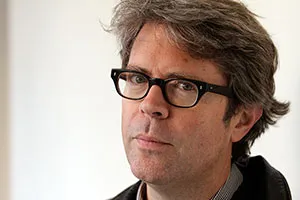Jonathan Franzen's '81 Place in American Literature

New York Magazine: Jonathan Franzen's Great Expectations: How America's foremost novelist became its leading public moralist
Love may not be the first word that comes to mind when you hear the name Jonathan Franzen ['81], but it’s a word that’s become more and more important to him over the years. “You have to love before you can be relentless.” That, whatever it means, is the last of Franzen’s rules for writing fiction, published in The Guardian in 2010. In 2011, Franzen told the graduating seniors of Kenyon College that “trying to be perfectly likable is incompatible with loving relationships.” His point was that it’s better to love, say, a spouse or birds than to spend too much time on Facebook. Franzen has also lamented “the near-perfect absence” in the fiction of his late friend David Foster Wallace “of ordinary love.” The paradox was that Wallace’s readers felt loved when they read his books, and in turn came to fiercely love their author.
Do you love Jonathan Franzen? Does America? Does the world? These questions sound ridiculous, but they’re the ones Franzen has been posing over the past two decades, as he has, against long odds, made himself the kind of public figure about whom they aren’t entirely ridiculous or even unusual. He started asking them in the mid-’90s in a series of essays — most famously, one published in Harper’s as “Perchance to Dream” in 1996 — that lamented the novelist’s diminished role in the culture; the burned-out state of “the inner city of fiction”; and the failure of his first two novels, despite critical acclaim, to connect with a wide readership. Yet he knew that, even if it had been a while since a writer more challenging than Scott Turow or Stephen King had appeared on the cover of Time, E. Annie Proulx, Toni Morrison, and Cormac McCarthy were still selling lots of books. Many of their readers, a sociologist informed him, were women; many were people who’d grown up, like Franzen, as social isolates (not necessarily nerds, Franzen took pains to point out); many were people whose lives had turned out to be different from their parents’ lives. These people wanted to read about lives not unlike their own, and to be entertained. Franzen would transform himself from an angry young man into their trusty bard. Or try.
Read the full article at New York Magazine.
Franzen's newest book, Purity, is reviewed at The New York Times, Los Angeles Times, Chicago Tribune, The Atlantic, and The Guardian, among other places.
In 2005, Franzen received an honorary Doctor of Humane Letters from Swarthmore. In his remarks, he advised the graduates that "you may be wrong about a lot of stuff now, wrong about almost everything, ... but you might as well get used to the kind of person you are right now, because that person isn't going anywhere." Franzen returned to campus in 2007 for the Theater Department's production of his English translation of Spring Awakening, after which he led a discussion with students. Franzen, who graduated from Swarthmore with high honors in German, originally translated the play for the German Department nearly 25 years ago. He also returned to campus for a public talk in 2013.



